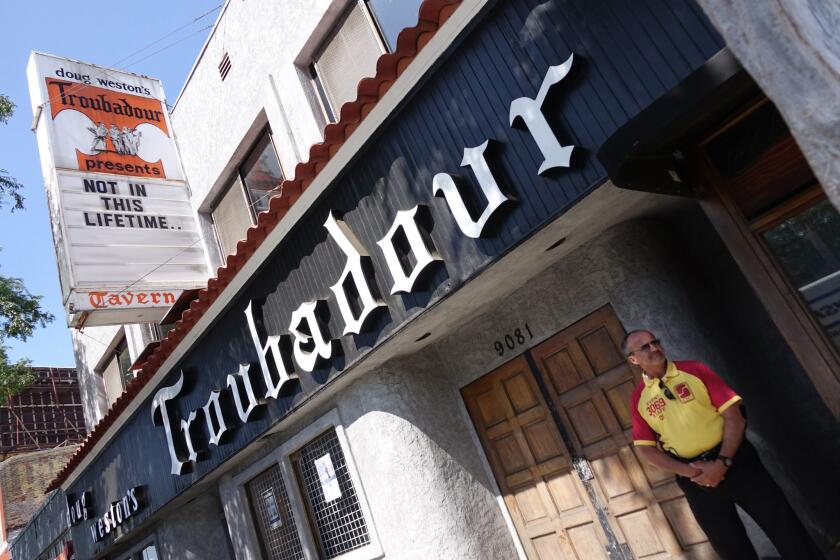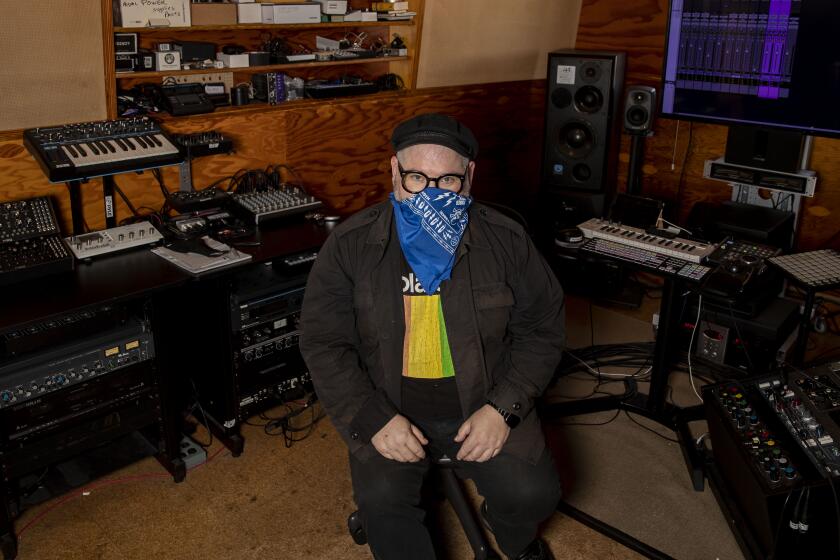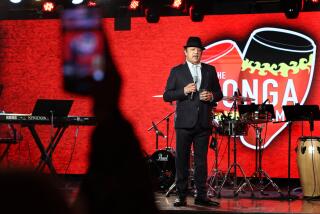Len Fagan, Coconut Teaszer rock impresario, dies of COVID-19 complications at 72
- Share via
Though hardly as famous as fellow Sunset Strip nightspots the Roxy and the Whisky A Go Go, the ramshackle nightclub Coconut Teaszer, at the corner of Sunset and Crescent Heights boulevards, tapped into a musical movement in the late 1980s and 1990s by booking early appearances by bands including Guns N’ Roses, Green Day, Rage Against the Machine and the Wallflowers.
At the heart of that success was Len Fagan. A former rock drummer turned talent buyer who spent much of his adult life living in Laurel Canyon and working on the Sunset Strip, the behind-the-scenes powerbroker died May 3 from COVID-19 complications. He was 72.
His death was announced on the Coconut Teaszer’s Facebook page.
The general manager of the Troubadour, which famously launched Elton John’s career, says ‘to survive, we’re going to need all the help we can get.’
“Every city, every scene needs a Len Fagan,” former Atlantic Records A&R executive Tim Sommer wrote in a Facebook post after learning of his death. “People like him keep live, original music alive, and if every city and town had a Len Fagan — that person who has a club and is willing to give anyone a shot, and then provide them a place to grow and find fans — the music scene in this country would be far, far better.”

As the brainchild behind the Coconut Teaszer’s biweekly live series “L.A.’s Best Kept Secrets,” Fagan presided over multi-artist showcases that became can’t-miss events for record-label talent scouts in the pre-YouTube era. In a 1990 column about nightlife hotspots, Times writer Bud Scoppa described Fagan as “so highly regarded as a judge of up-and-coming bands that he has received offers from several major labels to become an independent talent scout.”
Sommer called him “the patron saint and godfather of Los Angeles rock music.”
Fagan first broke into the music scene behind a drum kit. After getting his professional start as a member of the “Sgt. Pepper”-inspired band Wichita Fall, he cofounded Los Angeles hard rock band Stepson. For a while in the early 1970s, the quartet was a house band at the Whisky A Go Go and issued an album for ABC-Dunhill Records. Fagan’s drumming served as the propellant.
“He knew three beats, and he did them really well,” Stepson singer Jeff Hawks told The Times. “He was a real backbeat drummer. In the pocket. No fancy stuff. Just a powerhouse.” Added Hawks of the band, “It was right during the glam time, so we were a little strange.”
A longtime friend of the late Arthur Lee of Love, Fagan regularly backed Lee in Love’s various incarnations over the years. At one point, he also toured Asia as drummer for the ‘60s psychedelic pop band the 1910 Fruitgum Company.
The drummer found his calling, though, at a 200-occupancy spot in the heart of the L.A. record business.
“He was happy at the Teaszer because he had full control,” Hawks said. “He could book the bands he wanted, he could make events he wanted. He could have an oldies week or he could find a band that he really liked and give them an opportunity.”
Stars from the Doors to Prince recorded at Sunset Sound. Now, the studio is closed for the first time in 60 years, joining hundreds of others shuttered across L.A.
For bands, it was both a coveted slot and a hustle. Writing in the introduction of the book “We’ve Got the Neutron Bomb: The Untold Story of L.A. Punk,” Green Day’s Billie Joe Armstrong captured the essence of his band’s first-ever Los Angeles gig, at the Teaszer: “We were all under twenty-one, so we weren’t allowed inside the club. We waited our turn outside, sandwiched in between a strange lineup of bands that were trying to get signed on a major label. The stage wrangler hauled us in, and we played our twenty-minute set on borrowed gear. It was a good set, and people were genuinely into it. But before we got a chance to bask in the glory, we were asked to leave.”
In recent years, Fagan had suffered from poor health. A debilitating stroke a few years ago affected his ability to communicate, and he spent his final years in a nursing home.
In his prime, though, Fagan was an overwhelming presence, stresses Hawks, who points to the Stepson song “Lil’ Bit” as evidence. Written by Fagan, it’s about “a no-good greaseball” who won’t give up. “I want it all mama / And I dont’ know when to quit / I’m a big boy, baby / But they call me Lil Bit.”
More to Read
The biggest entertainment stories
Get our big stories about Hollywood, film, television, music, arts, culture and more right in your inbox as soon as they publish.
You may occasionally receive promotional content from the Los Angeles Times.













